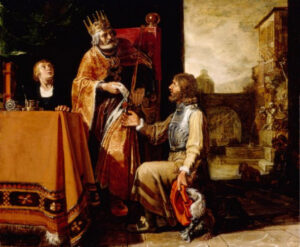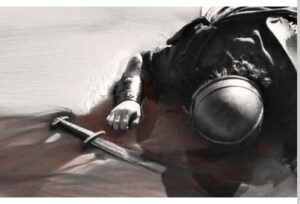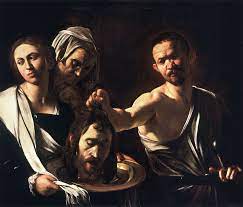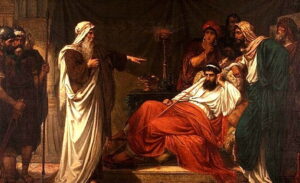Researched and prepared by Ruth Magnusson Davis
This post belongs to the series “Principal Matters from the 1537 Matthew Bible.” The purpose of the series is:
(1) To get to know the Table of Principal Matters in the Matthew Bible.
(2) To learn through Bible studies from the Reformation.
“As the bees diligently do gather together sweet flowers, to make by natural craft the sweet honey, so have I done with the principal topics contained in the Bible.”
So began John Rogers’ introduction to the Table of Principal Matters in the 1537 Matthew Bible. This Table was a concordance at the front of the book. It set out bible topics in alphabetical order. Under each topic were short headings, with bible verses for further study.
This Principal Matters series follows the topics in the order of the Table and sets out the bible verses in full, taken from the Matthew Bible, and gently updated as needed.
Topic: Adultery
The topic of adultery in the Table of Principal Matters was long, so I have divided it into 5 separate posts, this being Part 4.
Under the topic of adultery, Rogers drew twice from the Apocryphal writings. The first he drew from was the one-chapter book of Susanna, which we saw in Part 2. Here he drew from Ecclesiasticus (also known as “Sirach”), which is one of my favourites. Note, the Apocryphal books of the Matthew Bible were often quite different from later versions, so sometimes I had to improvise the verse numbering.
In the last post (Part 3) we saw how two heathen kings took Abraham’s wife Sarah into their houses, but once they learned that she was married, they sent her back to Abraham. These stories were given under heading 8, concerning how God punishes adultery. We saw there how God lifted punishment from the heathen rulers when they restored Sarah to her husband.
However, in this Part we see how the Israelite ruler King David not only committed adultery, but added murder to his sin in order to escape detection; and though he repented, punishment was never lifted from his house for the rest of his life. Sin always has consequences in this life, although for the saved the eternal consequences are remitted for the next life. At the end of this post, I added bible verses that deal with David’s punishment.
This part also covers King Herod, who took and married Herodias, his own brother’s wife. Herodias was angry at John the Baptist because he openly rebuked this egregious adultery, and so arranged for him to be beheaded.
And now, on to Part 4, which begins with the 10th heading under “Adultery” from the Table of Principal Matters in the 1537 Matthew Bible.
Adultery (cont’d)
(10) Adultery is the cause of procuring another man’s death.
2 Samuel 11:2-17 It chanced in an evening that David arose from his couch and walked upon the roof of the king’s palace, and from the roof saw a very beautiful woman washing herself. And he sent to inquire what woman it was. And it was answered him that she was Bathsheba, the daughter of Eliam, and wife to Uriah the Hittite.
And David sent messengers to fetch her; and she came to him, and he lay with her. And she was straightaway purified from her uncleanness, and returned to her house. And when the woman perceived that she had conceived, she sent and told David, and said, I am with child.
Then David sent a message to Joab [the commander of his army], directing him to send to him Uriah the Hittite. And Joab sent Uriah to David. And when Uriah had come to him, he asked how Joab was doing, how the people fared, and how the war prospered. And David said moreover to Uriah, Go down to your house, and wash your feet.
And Uriah departed out of the king’s palace, and there followed him a service from the king’s table. But Uriah slept at the door of the king’s palace with all the servants of his lord, and did not go down to his house.
Then they told David, saying, Uriah did not go down to his house. Then David said to Uriah, Seeing that you have come from journeying, why do you not go down to your house? And Uriah said to David, The ark and Israel and Judah dwell in pavilions, and my lord Joab and the servants of my lord live in tents upon the flat ground; and should I then go down into my house to eat, drink, and lie with my wife? By your life, and as sure as my soul lives, I will not do that thing. Then David said to Uriah, Tarry here this day also, and tomorrow I will let you depart.
And so Uriah remained in Jerusalem that day and the next day. And David called him, and he ate and drank before him, and he made him drunk. And in the evening, Uriah went out to lie on his couch with the servants of the lord, and did not go down to his house. Therefore, on the next day David wrote a letter to Joab and sent it by Uriah. And he wrote in the letter, saying, Put Uriah in the forefront of the battle, where it is most fierce, and get back from him, so that he may be smitten to death.
And as Joab besieged the city, he assigned Uriah to a place where he knew that strong men were. And the men of the city came out and fought with Joab. And there were certain men smitten among the people and among the servants of David, and Uriah the Hittite died also.
Loyal and faithful, Uriah the Hittite lies dead, slain by his king.
~~~
Matthew 14:3-10 [King] Herod had seized John [the Baptist], and bound him and put him in prison for the sake of Herodias, his brother Philip’s wife. For John said to him, It is not lawful for you to have her. But when Herod would have put him to death, he feared the people, because they counted John as a prophet.
But when Herod’s birthday came, the daughter of Herodias danced before them, and pleased Herod; whereupon he promised with an oath that he would give her whatever she would ask. And she, being first instructed by her mother, said, Give me here the head of John the Baptist on a platter.
And the king sorrowed. Nevertheless, because of his oath, and because of the people who were sitting also at the table, he commanded it to be given her. And he sent and beheaded John in the prison.
This gruesome image depicts the head of John the Baptist on a platter, after he was beheaded by King Herod.
~~~
See also Mark 6:14-29 (a parallel account of the adultery of Herod and Herodias, and how Herodias procured the death of John the Baptist.)
(11) Adultery defames the person.
Proverbs 6:29 Whoever goes in to his neighbour’s wife and touches her, cannot be guiltless.
Ecclesiasticus 23:18 & 21 A man who breaks wedlock, and who regards not his soul but says, Tush, who sees me? I am compassed about with darkness, the walls conceal me; nobody sees me; whom need I fear; the Most High will not remember my sins! – He understands not that his eyes see all things. For all such fear of men drives away the fear of God from him; for he fears only the eyes of men, and considers not that the eyes of the Lord are clearer than the sun, beholding all the ways of men and the ground of the deep, and looking even to men’s hearts in secret places. …
The same man shall be openly punished in the streets of the city, and shall be chased abroad like a young horse foal. And when he is least thinking upon it, he will be taken. Thus shall he be put to shame before everyone, because he would not understand the fear of the Lord.
Ecclesiasticus 23:22-26 And thus shall it go also with every wife who leaves her husband and gets inheritance by a strange marriage. First, she has been unfaithful to the law of the Most High. Secondly, she has forsaken her own husband. Thirdly, she has played the whore in adultery, and gotten her children by another man. She shall be brought out of the congregation, and her children shall be looked upon. Her children shall not take root, and as for fruit, her branches shall bring forth none. A shameful report shall she leave behind her, and her dishonour will not be put out.
And they that remain shall know that there is nothing better than the fear of God, and there is nothing sweeter than to take heed to the commandments of the Lord. It is a great honour to follow the Lord, for long life shall be received from him.
~~ ~~~ ~~

This 1611 painting is by Pieter Lastman. It depicts King David handing his loyal servant Uriah the Hittite the letter that directs Joab to make sure Uriah is killed in battle.
Here I (Ruth) add a section on the punishment that came on King David and his house due to his adultery with Bathsheba and murder of her husband Uriah. Note, as it was said above under heading 11, David was brought to open dishonour. Contrariwise, how sweet it would have been, had he heeded God’s commandments. Also, as it was said, David sought to hide from the eyes of man, and forgot that the eyes of God see all things.
The story of David’s grievous sins continues with Nathan the prophet going to the king’s palace to rebuke him, and to open his eyes to his sin. The prophet conveyed God’s message to him:
2 Samuel 12:7-15 Thus says the Lord God of Israel: I anointed you king over Israel, and delivered you out of the hands of Saul. And I gave you your master’s house, and your master’s wives into your bosom; and gave you the house of Israel and of Judah. And if that had been too little, I would have given you so much more. Why have you despised the commandment of the Lord, to do wickedness in his sight? You have killed Uriah the Hittite with the sword and taken his wife as your wife, and have slain him by the sword of the children of Ammon.
Now, therefore, the sword shall never depart from your house, because (says the Lord) you have despised me and taken the wife of Uriah the Hittite to be your wife. Thus says the Lord: Behold, I will stir up evil against you, even from your own house; and will take your wives before your eyes and give them to your neighbour, who will sleep with them in the sight of the sun. And you did it secretly, but I will do this thing before all Israel and in the open sunlight.
Then David said to Nathan, I have sinned against the Lord. And Nathan answered David, The Lord has put away your sin; you shall not die. However, because in doing this deed you have given the enemies of the Lord cause to rail, the child that is born to you will surely die.
And indeed, it came to pass that the child died, and that the sword never departed from David’s house. It reminds me of the proverb: he who rewards evil for good, evil shall never depart from his house (Proverbs 17:13).
The prophet Nathan rebukes David of his sin.
Notices:
– New Testament Scriptures are from the October Testament, the New Testament of the New Matthew Bible. The Old Testament Scriptures and Apocryphal writings are taken directly from the Matthew Bible, with obsolete English gently updated.
– Information about the New Matthew Bible Project is here.
– Sample scriptures from the New Matthew Bible are here.
– To find former topics, on the main blog page search under “Categories/ Principal Matters Series” for the subcategory with the appropriate letter. For example, for “Abomination,” look under Principal Matters Series/ Principal Matters A/Abomination.
– The preceding topics in this series are:
Adultery Part 1
Adultery 2 (Susanna)
Adultery Part 3



